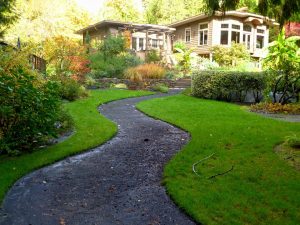A grass that every Australian would have walked over in their lifetime, Bermuda is a stalwart of backyards and sporting fields nationwide. Often referred to by its more common name of Couch (pronounced cooch), Bermuda got to its position as one of Australia’s prime grass choices for a multitude of very good reasons.
Originally and Indian/African plains grass, Bermuda came to prominence as a domestic grass after being transported on slave ships from Bermuda (hence the name) to North America, where gardeners and sports clubs soon worked out that when it came to surviving and thriving in warm season conditions, Bermuda is nearly unbeatable.
A warm season grass that seems custom-made for the Australian climate, Bermuda has a bright green/purple tipped blade that has previously had a reputation of not being the softest underfoot. More recent breeds have been made softer and softer though, making it a more child friendly option.
A favourite of Australian golf courses and suburban lawns alike, let’s have a look at what makes Bermuda Couch tick.
Pros
The key feature of Bermuda Couch is its hardiness. The grass has a system of roots that is particularly extensive, giving it the best chance of getting through tough conditions. Due to the make-up of the roots, extended periods of drought or waterlogging can be survived. While these sorts of conditions can make the grass brown off, a decent rain will generally bring it out of its dormant state and back to its normal vibrant colouring.
This hardiness extends to other areas too. It isn’t hugely fussed by soil quality or type, and can successfully grow in almost anything; the sandy soils of a coastline, the clay soils of farming areas, alkaline, acid or soils with high salinity. Bermuda will always have a dig and do its best to grow (to a point, obviously). Ensuring the grass has decent drainage and access to a healthy source of nutrients – fertilising if needed – will be all the grass needs to get by in all but the most extreme of soil conditions.
Unlike most grass varieties, Bermuda Couch has runners that spread both above ground (called stolons) and below ground (rhizomes). This makes the grass a particularly aggressive spreader, and any bare patches that you may have from your initial sowing of seed will more-often-than-not be quickly filled in without any need for a second sow.
Cons
The main drawback for Bermuda Couch is also one of its key strengths. It is a terrific spreader, but if you don’t keep an eye on its movements, that may come at the detriment of the other plants in your garden. Ensuring that you border off any areas in your backyard that you want to keep grass free – flower beds, vegie patches – is vital, as any areas with open soil will quickly be encroached upon.
If you have let the turf have free reign in your backyard, the hardiness of the grass can also become a negative. Getting rid of unwanted Bermuda Couch can be a task. You’ll need to let the grass grow out for a few weeks – the more blade to soak up herbicide, the better – and within a7-10 days of herbicide application, you should start to see the grass dying off. You will probably need to reapply the herbicide once or twice more, every couple of weeks, as those underground rhizomes may not be affected by just one application, and new shoots could form.
Growing Your Lawn
If you’re thinking about choosing Bermuda Couch for your patch, there are a few things to keep in mind when planting.
Bermuda Couch is a warm season grass, and while it’s hardy, it won’t live up to its potential in places like Tasmania and Southern Victoria.
You’ll want to sow the seed when you have a good stretch of 25+ degree weather. For more temperate areas of Australia this will mean a summer sowing. You’ll need just 10g of seed per square metre, meaning a lawn of 100sqm will require just 1kg of seed.
For a hardy strain of Bermuda Couch that is still beautiful and soft underfoot, try McKays’ Pure Sahara Bermuda Couch.

